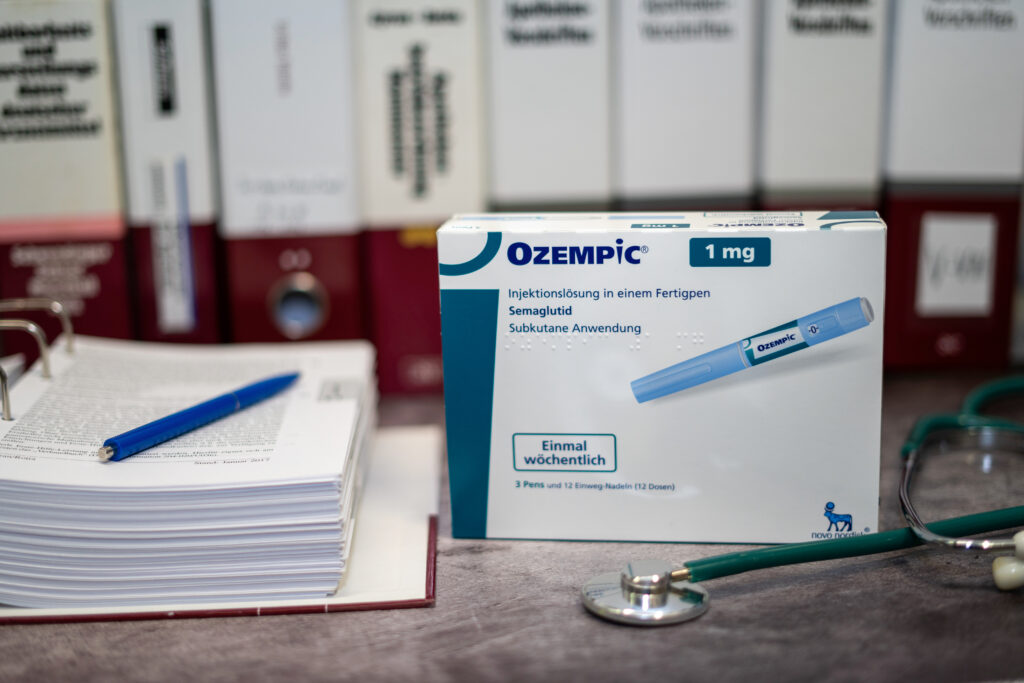
Ozempic has exploded onto the weight loss scene, with people from Elon Musk to Chelsea Handler sharing their success stories on social media. The injectable medication, formerly known as Wegovy, is designed to treat Type 2 diabetes and obesity.
Before starting Ozempic, tell your doctor about all prescription and over-the-counter medications, vitamins, herbs, and supplements you take. Some can interact with Ozempic, causing serious side effects.
How Ozempic Works
Ozempic is an injectable medication that works by mimicking a natural hormone in your body, GLP-1. [1] GLP-1 acts on both your brain and digestive system to make you feel full after a meal and also reduces the secretion of insulin in response to eating, thereby helping to control blood sugar levels and suppress appetite.
Ozempic was originally designed to treat diabetes but has been found to be highly effective for weight loss as well. It has been shown to lower a person’s hemoglobin A1C (or HbA1c) by about 7%, and some studies have demonstrated that it can be used alone or with other medications, including insulin, to achieve this goal.
The drug is available by prescription only. It is often prescribed off-label by obesity medicine specialists who treat patients with a medical approach to obesity, rather than just using diet or exercise. However, doctors can be reluctant to prescribe anti-obesity medications for fear of malpractice lawsuits.
How to Take Ozempic
Before using Ozempic, wash your hands with soap and water. Then, take the pen out of its case and wipe it with an alcohol swab to prepare the injection site. Inject the medication into your abdomen, upper thigh or upper arm. Be sure to rotate your injection sites each week to help prevent skin irritation. Always carry an extra pen and new needle with you in case one is lost or damaged.
It may take a few weeks for the full effect of Ozempic to build up in your body. While you wait, do not miss meals and consume fewer carbohydrates than usual. Also, drink plenty of fluids. Avoid drinking too much caffeine, which can affect how well Ozempic works for you.
Serious allergic reactions (including swelling of your face, lips, tongue, or throat) have happened in some people who use Ozempic. Call your doctor right away if you have these symptoms, or if you have severe pain in your stomach area that will not go away with vomiting, or clay-colored stools.
Common Side Effects
Ozempic is a safe medication, but like any drug, it can cause side effects. These side effects are usually mild and improve with time. Stomach side effects, like nausea, vomiting and diarrhea, are the most common with Ozempic. They occur because the drug slows the movement of food through the stomach. This causes your body to gather extra air, which is released when you burp or pass gas.
Other gastrointestinal symptoms with Ozempic include flatulence and acid reflux. These are more likely to occur with higher 0.5-milligram (mg) doses of Ozempic than lower 1 mg doses.
Other, less common, side effects with Ozempic may include low blood sugar (hypoglycemia). This is more likely to happen if you take this medication with insulin or a sulfonylurea. Signs and symptoms of low blood sugar include dizziness or lightheadedness, confusion or drowsiness, sweating, blurred vision, hunger, shaky feeling, fast heartbeat, weakness, tingling in the hands and feet, and trouble thinking.
Precautions
Serious side effects from Ozempic aren't common, but they can occur. If you have any symptoms that seem life-threatening, call your doctor right away.
Some of the most common side effects from Ozempic are stomach related-things like nausea, bloating and gas. If they don't go away, your doctor may recommend diet changes or suggest over-the-counter (OTC) medication to help with the problem.
You should avoid eating fatty or greasy foods while using this medication. These types of foods can increase your chances of having an allergic reaction to Ozempic.
Talk to your doctor about your family history of pancreatitis (inflammation of the pancreas) before taking Ozempic. It's also important to tell your doctor if you have any other medical conditions, such as liver or kidney disease.
It's important to tell your doctor about all of the medications and supplements you take, including OTC medications, vitamins, herbs and dietary supplements. Some of these can interact with Ozempic and change how well it works or cause serious side effects.





